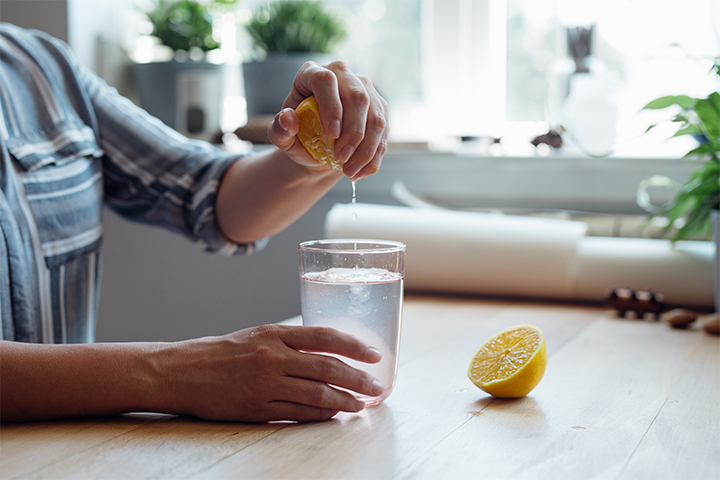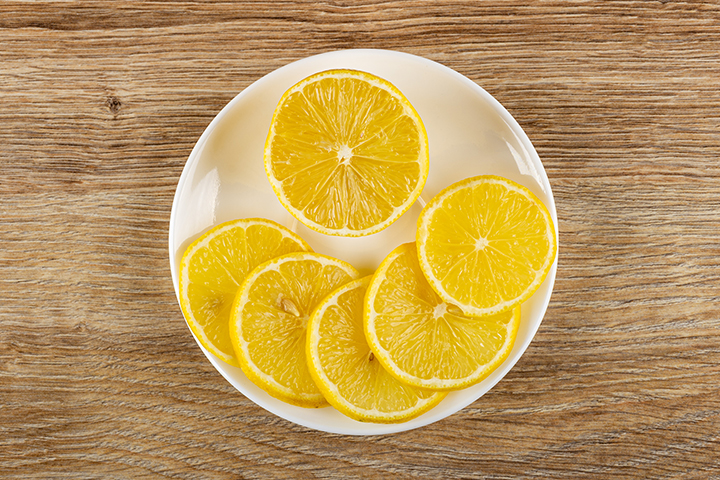Lemon water is a refreshing drink that is rich in vitamin C and helps prevent and cure the common cold. It is also popularly used as a therapeutic agent in folk medicine. However, the consumption of lemon water when breastfeeding should be regulated since lemon can aggravate acidity in sensitive individuals.
Read on to learn more about whether it is safe to drink lemon water while breastfeeding, its possible health benefits and side effects, the nutrition content of lemon water, and some precautions nursing mothers should take while consuming lemon water.
Is Lemon Water Safe When Breastfeeding?
Yes, lemon water is considered “safe to drink” when breastfeeding. It is most commonly recommended to stay hydrated and keep digestive issues, such as bloating, at bay (1). When breastfeeding, this healthy drink could add variety to your daily water intake.
The lemon water prepared from fresh lime juice at home is comparatively healthier than the premixes, such as lemonade, available in the market. However, just like any other beverage or food, have lemon water in moderation.
Nutritional Value Of Lemon Water
Lemon juice is rich in phenolic compounds, vitamins, minerals, dietary fibers, carotenoids, and essential oils (2). Besides, it also has a considerable amount of citric acid that possesses various health-benefiting properties (3).
Possible Health Benefits Of Lemon Water
Regular consumption of lemon water could provide the following benefits to the lactating mother and the breastfeeding baby.
- Hydration: Anecdotal evidence suggests that lemon water could promote hydration, which in turn supports having optimum breast milk supply. However, scientific studies on the effect of lemon water on dehydration are limited (4).
- Weight management: Lemon water (without sugar) is a low-calorie beverage that can be an ideal replacement for various high-calorie beverages, such as sweetened apple juice and soft drinks. This replacement helps reduce your total calorie consumption while keeping you hydrated. Besides, several scientific studies show that lemon juice contains polyphenols that help in sustainable weight loss by fighting body fluid retention (5).
- Digestive health: Research studies show that citrus fruits have positive effects on the digestive system due to their digestion-enhancing properties (6). Enhanced digestion ensures better nutrient absorption. It also keeps digestive problems, such as acidity, at bay (7).
- Gut health: Some animal-based research studies show that the lemon polyphenols such as Eriocitrin found in lemon juice and peel could have positive effects on the host and the intestinal microbiome (8).
- Liver health: Citric acid makes fresh lemon water an effective drink that could also act as a detox drink for the liver. A research study showed the hepatoprotective effect of lemon juice, attributed to the presence of citric acid (9) (10).
- Immunity: Lemon juice, just like several other sister citrus fruits, contains vitamin C, antioxidants, and several micronutrients that likely have a positive effect on the immune system (11). An in vitro study demonstrated the possibility of antimicrobial properties of lemon juice that could support immunity (12).
- Blood sugar control: Excess pregnancy weight can have an impact on blood sugar levels. Research suggests that a compound called naringenin found in lemon juice may help in regulating blood sugar levels (13). Anecdotally, lemon water is also considered a blood purifier.
- Cardiovascular health:A research study on lemon, honey water fasting demonstrated blood pressure-lowering effects of lemon on healthy individuals (14) (2)due to the anti-inflammatory properties of citric acid and antioxidants.
- Skincare: Some research studies note that vitamin C and antioxidants found in lemon juice have skin repairing and protective properties (15). Besides, lemon juice also has functional properties that might help strengthen the veins (16). Anecdotally, regular consumption of lemon juice is considered effective in reducing the aging effects.
Lemon juice may also provide symptomatic relief from sore throat.
Possible Side Effects Of Lemon Water
Lemon water has several health-promoting properties. However, it is pertinent to know about the possible side effects too.
- Tooth enamel damage: Overconsumption of lemon water could cause tooth enamel erosion as lemon juice contains high amounts of citric acid. To avoid this, rinse your mouth with warm water after consuming concentrated lemon water or juice.
- GERD and ulcers: Lactating mothers with GERD or ulcers during the nursing phase should avoid lemon water due to its acidic nature.
- Allergy: Lemon allergy is uncommon but cannot be ruled out. Some documented cases show exacerbation of existing respiratory allergies, such as asthma, due to the inhalation of the aroma from lemon peels (17).
Precautions While Consuming Lemon Water When Breastfeeding
- Consume lemon water in moderation. The best time to have it is early morning after you wake up and 30 minutes after meals.
- Prefer freshly squeezed juice to the premixed lemon powders available in the market.
- Avoid using hot water to prepare lemon water as it can destroy heat-sensitive vitamins such as vitamin C. It reduces the total vitamin C content of this healthy beverage. Therefore, prepare lemon water with lukewarm or cold water.
- Do not store half-cut lemon in the refrigerator. Lemon stored this way can harbor harmful microbes. Besides, a chopped lemon could lose nutrients due to exposure to air and light.
- You can prepare infused lemon water by adding some lemon slice, cucumber slice, and mint leaves in water. However, when you do so, ensure that the lemon is cleaned properly. Fill this infused water in a water bottle and store it for a day if required. You might consider using an infusion bottle for the same.
- Consume lemon water as early as possible. If you want to store it for some time, keep it in an airtight bottle in the refrigerator. However, freshly squeezed water should not be stored for a long time.
- Do not store lemon juice in a copper bottle since the citric acid will react with copper. It can cause the formation of compounds that could be toxic to the body and thus lead to vomiting.
If you wish to drink lemon water while breastfeeding, opt for the freshly squeezed ones prepared at home to reap maximum benefits. It can let you avoid additives and preservatives often present in store-bought lemon water. Lemon water can be a highly nutritious beverage that can offer several benefits, such as maintaining an adequate breast milk production and controlling blood sugar levels, besides several other benefits. However, it may also lead to certain side effects for mothers with underlying conditions. Hence, lemon water while breastfeeding is safe as long as it is consumed with the necessary precautionary measures.
Key Pointers
- Lemon juice is good for hydration and can increase breast milk supply.
- Lemon juice can help with digestion, cardiovascular health, gut health, and liver health.
- Lemon juice can boost immunity, improve skin health, manage blood sugar levels, and aid in weight management.
- If you have GERD or ulcers, you should avoid lemon juice because of its acidic nature.
- For breastfeeding mothers, homemade lemon juice is a better choice than premixed juices.
Are you a habitual consumer of lemon water and wondering if it’s safe during pregnancy and breastfeeding? Watch this video to find out.















